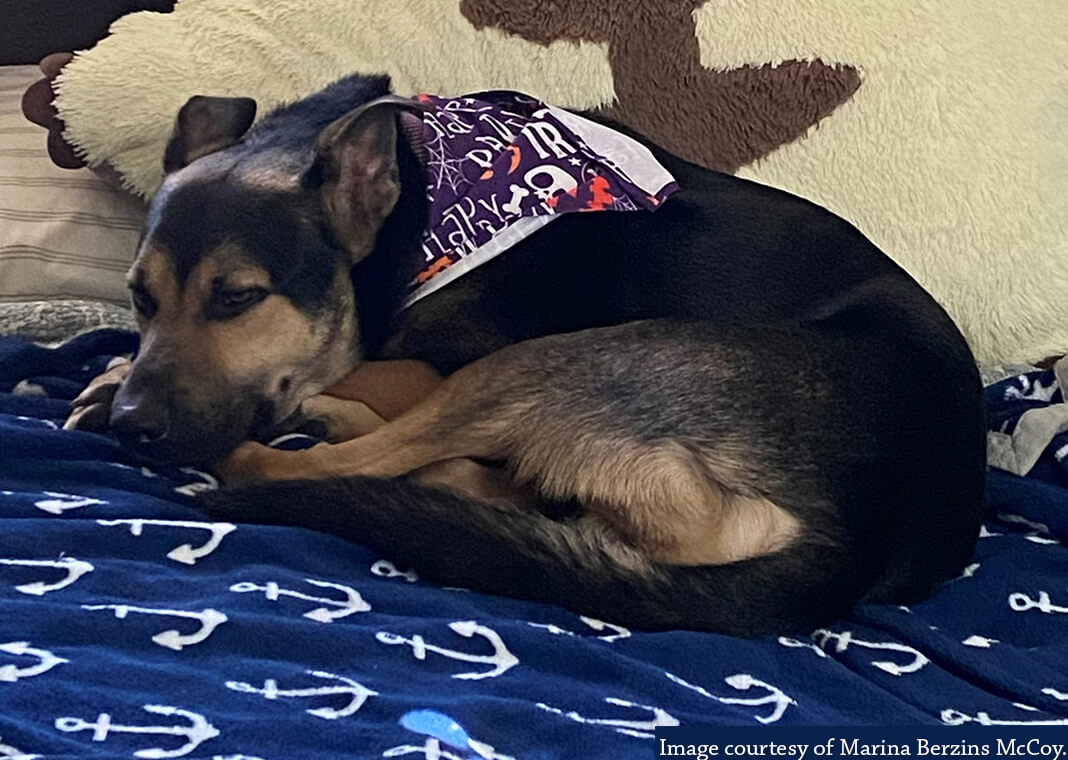
We recently adopted a new dog, a German Shepherd around two years old. He is a shelter dog and was previously in at least two homes before he landed in a shelter. From there, he went to a foster family for a while and finally has found his “forever home” with us. Our dog is a delight to us; he is smart, affectionate, and loves to play and snuggle. However, he has considerable separation anxiety. For the first week, he would follow me into every room and would not hang in his own fenced-in backyard without my being in his sight.
Now, he’s adjusting. He still does not love it when I leave temporarily. He can whine and look out the window until someone else at home gets him engaged in activity. Still, he’s now much more willing to go nap in the living room while I write on the computer in the nearby home office or to sniff around in the yard while I am making dinner in the kitchen. We give him lots of play and exercise, plenty of cuddles, and praise him with both treats and affectionate words in his training. We want our dog to know that we are here for him and love him, whether he sees us or not.
As we human beings go through life, we can go through something akin to what my dog is learning, only in relation to God. We hopefully come to know that God is ever-present, both in times when we feel God’s presence in a more engaged way and in times when that feeling is less present. I’ve had periods in my life when my prayer life was filled with considerable consolation, such as in imaginatively praying an Ignatian contemplation. Then I’d feel firsthand God’s love for me. Perhaps it was God’s way of giving me my own “cuddles” and “treats,” as well as to bring me into relationship with Jesus.
At other times in my prayer life, God’s presence is much quieter. It’s not that God is absent, but rather more that I have a calm and unspoken sense that God is present, everywhere. Sometimes I just hang out with my dog, and we don’t interact, but we mutually know the other is there.
Can we have separation anxiety from God? I think so! I can recall a time when I felt a difficult dryness, when the consoling sense of God’s presence disappeared, and I wondered where God had gone. Had I done something wrong? What was happening? I learned that I had to rely on faith and love God and not just the consolation. Much like my dog, who continues to learn that when I go away I have not abandoned him, my time of dryness serves as a training lesson in learning that God is bigger than the consolations. God is always faithful and always there for us. But like my pup, we have to learn to roll with the changes, accepting that there are times when we have lots of consolations, times of dryness, and times of experiencing an enduring, silent presence of love.
Perhaps I could say that our dog, in a way, is learning from my husband and me the fidelity of love: “You will be my people, and I will be your dog” (with thanks to Jeremiah 30:22).

Such a beautiful post and a wonderful comparison between the Love God has for us and the Love our dogs can for their people. In Matthew 4, the word “worship” is compared to that of a dog licking its master’s hand. When I come home, whether it’s a minute, an hour, or a day, my German shepherd is overcome with joy to see me and to spend time with me. Just as our beloved pets “worship” us when in our presence, we should be overcome with that same joy when in the presence of our Lord.
Thanks Marina for this beautiful post. We are all companion species – humans, animals, trees, and all that moves on Planet Earth, our common home.
Marina,
Such a beautiful post about your dog. I have a rescue as well and he is enjoying his “forever” home. Among the many gifts of this experience (adopting a dog) has been HIS decision to find a “job” which in his case is to take me on walks each day at exactly the same time! On his brown and white fur, there is a perfectly shaped heart. Your story is such a wonderful metaphor for God’s ever-loving presence with me and the Ignation “helps” that enrich my sometimes-complicated relationship with God in times of consolidation and dryness.Thank you.
Very insightful as always! Thank you Marina!
Thank you, Lynda!